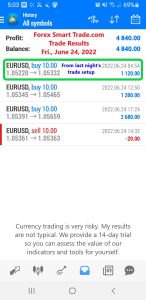Forex Trade Results June 24, 2022 – $4,840

Forex Trade Results June 23, 2022 – $4,031
June 23, 2022
Forex Trade Results June 27, 2022 – $140
June 27, 2022Forex Trade Results June 24, 2022 – $4,840
Retail Forex Brokers.
Let’s learn more about retail forex brokers.
In the past, only the big speculators and highly capitalized investment funds could trade currencies. But thanks to retail forex brokers and the Internet, this isn’t the case anymore.
With hardly any barriers to entry, anybody could just contact a broker, open up an account, deposit some money, and trade forex from the comfort of their own home.
Brokers basically come in two forms:
- Market makers, as their name suggests, “make” or set their own bid and ask prices themselves and
- Electronic Communications Networks (ECN), who used the best bid and ask prices available to them from different institutions on the interbank market.
Market Makers
Let’s say you wanted to go to France to eat some snails. In order for you to transact in the country, you need to get your hands on some euros first by going to a bank or the local foreign currency exchange office.
For them to take the opposite side of your transaction, you have to agree to exchange your home currency for euros at the price they set.
Like in all business transactions, there is a catch. In this case, it comes in the form of the bid/ask spread.
For instance, if the bank’s buying price (bid) for EUR/USD is 1.2000, and their selling price (ask) is 1.2002, then the bid/ask spread is 0.0002.
Although small, when you’re talking about millions of these forex transactions every day, it does add up to create a hefty profit for the market makers!
You could say that market makers are the fundamental building blocks of the foreign exchange market.
Retail market makers basically provide liquidity by “repackaging” large contract sizes from wholesalers into bite-size pieces. Without them, it will be very hard for the average Joe to trade forex.

Learn to Day Trade
If you’d like to earn extra income trading on the Forex market, consider learning how to currency trade with Forex Smart Trade. With their super-accurate proprietary trading tools and best-in-the-business, personalized one-on-one training, you’ll be successful. Check out the Forex Smart Trade webinar. It shows one of their trader’s trading and how easy, intuitive, and accurate the tools are. Or try the Forex Smart Trade 14-day introductory trial for just TEN dollars.

